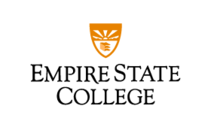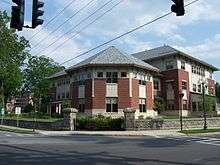Empire State College
 | |
| Type | Public Liberal Arts |
|---|---|
| Established | 1971 |
| Endowment | $14.5 million[1] |
| President | Merodie A. Hancock[2] |
Academic staff | 198 full time and 1,206 part time[3] |
| Undergraduates | 18,656[4] |
| Location |
Saratoga Springs, New York, USA (administrative offices) |
| Campus | 35 locations across the state of New York |
| Affiliations | State University of New York |
| Website | http://www.esc.edu/ |
Empire State College, one of the 13 arts and science colleges of the State University of New York, is a multi-site institution offering associate, bachelor's, and master's degrees,[5][6] and distance degrees worldwide through the Center for Distance Learning. The School for Graduate Studies offers master's degrees. Empire State College's Center for International Programs also has special programs for students in Lebanon through the American University of Science and Technology, Czech Republic, and Greece. From 2005 to until 2010, Empire State College and Anadolu University in Turkey offered a joint MBA program. It also has arranged learning opportunities with UAW-Ford University, United Steelworkers of America, Corporate Noncredit Training, eArmyU, Navy College Program and the International Brotherhood of Electrical Workers (Local Union #3).
The College is accredited by the Middle States Association of Colleges and Schools.[7] Empire State College administrative offices are located in Saratoga Springs, New York.
History
| Name | Tenure |
|---|---|
| James W. Hall | 1971–1998 |
| Joseph B. Moore | March 2000 – June 2007 |
| Kimberly Cline (acting) | June 2007 – October 2007 |
| Joyce Elliott (interim) | October 2007 – July 31, 2008 |
| Alan Davis | August 1, 2008 – July 31, 2012 |
| Meg Benke (acting) | August 1, 2012 - May 8, 2013 |
| Merodie A. Hancock | May 9, 2013 – present |
Empire State College was designed by then SUNY Chancellor Ernest Boyer in a document titled "Prospectus for a New University College." [8] In 1971, Ernest L. Boyer, chancellor of the State University of New York, conceived a new college for the state’s public university: a college dedicated to adult, student-centered education. Empire State College would invite people into higher education by removing impediments to access such as time, location, institutional processes, and even curricular custom, as well as habits of learning and teaching. Students individually would define their academic needs, purposes and efforts. The college would be flexible in supporting them, through its faculty, policies and procedures, to achieve demonstrable college-level learning. This is the animating idea and the root of Empire State College.
Orientation
Empire State College fulfills this mission by providing learning opportunities designed to accommodate students with family, work and community responsibilities. At the core of the learning-teaching environment is individualized study and the creation of an individual degree plan that is supported by a faculty mentor to whom each student is assigned. Empire State College students can take advantage of multiple modes of study including guided independent studies, study groups, intensive residencies, online courses and blended-learning experiences. The college also was one of the first institutions in the United States to develop a program of prior learning assessment, whereby students may earn college credit through assessment of prior learning from their work and life experiences.
The undergraduate degrees within broad areas of study offered by Empire State College are individualized to support a learner's academic, career or personal goals.[9] The college offers flexible programs, including distance education, extensive transfers of credits from other universities, prior-learning assessment for knowledge gained through independent studies, standardized evaluations, and the opportunity to design one's own degree with an academic advisor or mentor.[10]
Degree Programs
|
Undergraduate Programs |
Undergraduate Areas of Study
|
Graduate Programs
|
Certificate Programs
|
Undergraduate
|
Graduate
|
Locations
|
|
|
|
Notable alumni

- Amy Arbus, photographer
- Ita Aber, artist and curator[11]
- Kenny Barron (1978), jazz pianist
- Ginny Brown-Waite (1976), US Congresswoman
- Dawoud Bey (1990), photographer
- Alice Fulton (1978), English professor, winner of the 1991 John D. and Catherine T. MacArthur Foundation fellowship for poetry
- Deborah Gregory (1986), author of Cheetah Girls
- Bob Herbert (1988), New York Times columnist
- Kathleen M. Jimino, Rensselaer county executive
- Bernard Kerik, former NYPD commissioner under Mayor Rudolph Giuliani
- James J. LeCleir (1974), U.S. Air Force Major General
- Elliott Murphy (1988), singer-songwriter & author
- Mae Ngai historian, Columbia University
- Alan Rachins (1974), television actor
- Mark J.F. Schroeder, New York State Assemblyman and Buffalo City Comptroller-Elect
- Herb Trimpe (1997), artist on "The Incredible Hulk" comic series
- Bob Watson (1999), major league baseball player
- Reggie Witherspoon, coach of University at Buffalo men's basketball team
See also
- University of New York, Tirana
- University of New York, Prague
- SUNY Learning Network
- Non-traditional student
References
- ↑ As of June 30, 2011. "U.S. and Canadian Institutions Listed by Fiscal Year 2011 Endowment Market Value and Percentage Change in Endowment Market Value from FY 2010 to FY 2011" (PDF). National Association of College and University Business Officers. January 17, 2012. p. 21. Retrieved March 22, 2012.
- ↑ "About Merodie Hancock". State University of New York. Retrieved 2013-09-06.
- ↑ "2010–2011 Fact Book". Saratoga Springs, New York: Empire State College: 95.
- ↑ "2010–2011 Fact Book". Saratoga Springs, New York: Empire State College: 30.
- ↑ Patricia Lefor; Meg Benke; Evelyn Ting (2001). "Empire State College: The Development Of Online Learning". International Review of Research in Open and Distance Learning. 1 (2): 1–16.
- ↑ Jack Lindquist (1976). "Empire state college: Can there be an experimenting college?". New Directions for Higher Education. 1976 (15): 83–94. doi:10.1002/he.36919761507.
- ↑ Listing on MSCHE Institution Directory
- ↑
- ↑ "Colleges Without Walls". Time Magazine. Time, Inc. 1972-08-28. Retrieved 2009-03-23.
- ↑ James W. Hall; Richard F. Bonnabeau (1993). "Empire State College". New Directions for Higher Education. 1993 (82): 55–66. doi:10.1002/he.36919938206.
- ↑ Barbara J. Love (2006). Feminists who changed America, 1963-1975. University of Illinois Press. p. 2. ISBN 978-0-252-03189-2. Retrieved 4 January 2012.
External links
| Wikimedia Commons has media related to Empire State College. |
Coordinates: 43°04′40″N 73°46′57″W / 43.0777°N 73.7826°W
